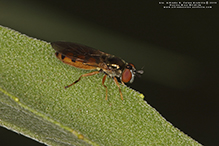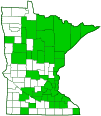Sedgesitters
(Platycheirus spp.)
Overview • Description • Distribution • Taxonomy

Overview
Platycheirus is a large species of hoverflies called sedgesitters. There are about 220 Platycheirus species worldwide, 75 species in North America north of Mexico, and at least 7 species in Minnesota.
Adults are found in moist woodlands, humid meadows, marshes, fens, and other wetlands, and on lake shores. They feed on the pollen of sedges and other low-growing, wind-pollinated plants. Larvae feed on aphids and decomposing plant material.
Description
Platycheirus are relatively small, narrow-bodied hoverflies. The face is black. The compound eyes are bare. The exoskeletal plates above the first and second segments of the thorax (scutum and scutellum respectively) are black with no yellow markings. The swelling on each rear corner of the scutum (postpronotum) is bare. On the underside of the thorax, the area in between the middle and hind legs (metasternum) is unmodified, not small and diamond-shaped. The abdomen is usually black with pairs of yellow, orange, or silvery spots on each segment. The wings are longer than the abdomen. The vein on the leading edge of the wing (costa) ends at or slightly beyond the wing tip.
Identification to the species level requires close examination of the front leg and sometimes the middle leg of the male. Females of some species cannot be identified from a photograph.
Distribution |
||
|
Sources Biodiversity occurrence data published by: Minnesota Biodiversity Atlas (accessed through the Minnesota Biodiversity Atlas Portal, bellatlas.umn.edu, 10/29/2025). Telford, Horace S.. (1939). The Syrphidae of Minnesota. University of Minnesota. Minnesota Agricultural Experiment Station. |
|
| 10/29/2025 | ||
Taxonomy
Order
Suborder
Brachycera
Infraorder
Cyclorrhapha
Zoosection
Aschiza
Family
Syrphidae (Hover Flies)
Subfamily
Syrphinae (Typical Hover Flies)
Tribe
Bacchini
Subordinate Taxa
blackspine sedgesitter (Platycheirus scambus) ![]()
![]()
broad-bodied sedgesitter (Platycheirus kelloggi) ![]()
California sedgesitter (Platycheirus russatus) ![]()
cobalt sedgesitter (Platycheirus pictipes)
comb-legged sedgesitter (Platycheirus immarginatus) ![]()
![]()
confusing sedgesitter (Platycheirus confusus) ![]()
coppery sedgesitter (Platycheirus luteipennis)
delicate sedgesitter (Platycheirus angustatus) ![]()
![]()
eastern forest sedgesitter (Platycheirus obscurus) ![]()
![]()
fourspot sedgesitter (Platycheirus rosarum) ![]()
![]()
greater punctate sedgesitter (Platycheirus stegnus) ![]()
hooked sedgesitter (Platycheirus coerulescens) ![]()
hornhand sedgesitter (Platycheirus granditarsis)
many-tufted sedgesitter (Platycheirus scutatus)
meadow sedgesitter (Platycheirus quadratus) ![]()
![]()
nearctic broadhand sedgesitter (Platycheirus nearcticus) ![]()
![]()
pearly sedgesitter (Platycheirus hyperboreus)
silver sedgesitter (Platycheirus varipes)
smoky-winged sedgesitter (Platycheirus clypeatus)
Thompson’s sedgesitter (Platycheirus thompsoni)
twospear sedgesitter (Platycheirus nodosus)
western forest sedgesitter (Platycheirus trichopus) ![]()
yellow sedgesitter (Platycheirus modestus)
yellowspine sedgesitter (Platycheirus scamboides)
yellow-legged sedgesitter (Platycheirus thylax) ![]()
Synonyms
Common Names
sedgesitters
Glossary
Costa
On ferns: The central axis of a pinna, to which pinnules are attached. On mosses: the central axis (midvein) of a leaf. On insects: The vein on the leading edge of the forewing.
Scutellum
The exoskeletal plate covering the rearward (posterior) part of the middle segment of the thorax in some insects. In Coleoptera, Hemiptera, and Homoptera, the dorsal, often triangular plate behind the pronotum and between the bases of the front wings. In Diptera, the exoskeletal plate between the abdomen and the thorax.
Scutum
The forward (anterior) portion of the middle segment of the thorax (mesonotum) in insects and some arachnids.
Visitor Photos
Share your photo of this insect.
This button not working for you?
Simply email us at info@MinnesotaSeasons.com.
Attach one or more photos and, if you like, a caption.
|
||
Alfredo Colon |
 |
|
MinnesotaSeasons.com Photos
|

Slideshows

Visitor Videos
Share your video of this insect.
This button not working for you?
Simply email us at info@MinnesotaSeasons.com.
Attach a video, a YouTube link, or a cloud storage link.
Other Videos



